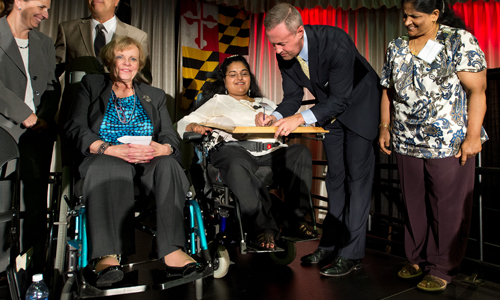Americans with disabilities are often overlooked for their purchasing power. According to a 2010 report from the U.S. Census Bureau, one in five Americans have a disability. That number equates to nearly 51.2 million Americans in 2015 with a disability. What’s more is that businesses can tap into this market providing products and services for people with disabilities.
The U.S. Department of Labor also found that Americans with disabilities have $175 billion in discretionary spending. These numbers illustrate how businesses can benefit by catering to people living with disabilities.
Tech companies leading inclusive-base services for people with disabilities
Microsoft is launching an app called Soundscape. The project is an effort to use “innovative audio-based technology” to help blind people or those with low vision to have a better understanding of their surroundings through a 3D audio experience.
The app developed by Microsoft’s engineering team allows users to set audio beacons at familiar destinations and landmarks, and then use audio cues to give users a better understanding of their surrounds. The app can be used simultaneously while running other programs on users’ phones. This isn’t the only product the multinational tech company is providing.
Among Soundscape, Microsoft announced it is making a videogame controller designed for people with disabilities.
Not far behind, Waymo, the Google-spinoff testing self-driving cars, is expected to launch a ride-hailing service program that will include audio tools and Braille labels inside its cars to allow people who are visually impaired to operate functions inside the vehicle.
Americans who have vision difficulties are 7.7 million, according to the Census Bureau, and new technological advancements such as AI can help expand services and products to people with disabilities.
What are some of the ways local companies in your area that are catering to people living with disabilities?
Steering clear from violating regulations
Although tech companies are finding ways to create every day products for disabled people to use, there are certain services that still fall short. Transportation services are still a dilemma as companies such as Uber and Lyft struggle to make their services more accessible for people in wheelchairs and scooters.
A report by New York Lawyers for the Public Interest claimed ride-hailing services are “useless” for people with disabilities because vehicles lack the proper equipment needed to serve customers in wheelchairs or scooters. This issues comes twofold when covering people with disabilities and federal regulations.
As more startups are looking to offer their services to people, how are they meeting federal regulations such as the Americans with Disabilities Act to offer equal access to all customers?











